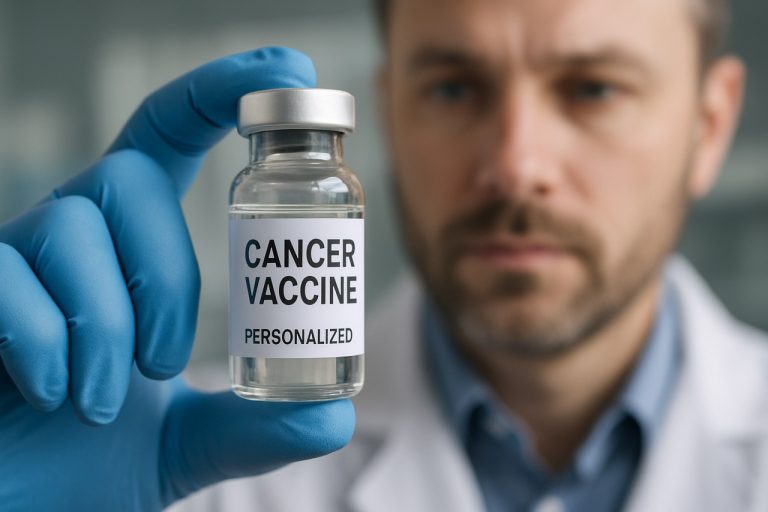
Immunoinformatics for Personalized Cancer Vaccines Market Report 2025: Unveiling AI Innovations, Market Dynamics, and Global Growth Projections. Explore Key Trends, Competitive Analysis, and Strategic Opportunities Shaping the Next Five Years.
- Executive Summary & Market Overview
- Key Technology Trends in Immunoinformatics for Personalized Cancer Vaccines
- Competitive Landscape and Leading Players
- Market Size, Growth Forecasts, and CAGR Analysis (2025–2030)
- Regional Market Analysis: North America, Europe, Asia-Pacific, and Rest of World
- Opportunities, Challenges, and Regulatory Considerations
- Future Outlook: Strategic Recommendations and Emerging Innovations
- Sources & References
Executive Summary & Market Overview
Immunoinformatics for personalized cancer vaccines represents a rapidly evolving intersection of computational biology, immunology, and oncology, aiming to revolutionize cancer treatment by tailoring vaccines to individual patient tumor profiles. This approach leverages advanced algorithms and high-throughput sequencing to identify tumor-specific neoantigens, enabling the design of vaccines that stimulate a patient’s immune system to target and destroy cancer cells with high specificity.
The global market for immunoinformatics-driven personalized cancer vaccines is poised for significant growth in 2025, driven by increasing cancer incidence, advances in next-generation sequencing (NGS), and the expanding adoption of artificial intelligence (AI) in drug discovery. According to Grand View Research, the overall cancer vaccines market was valued at USD 7.1 billion in 2023 and is expected to grow at a CAGR of 12.6% through 2030, with personalized approaches representing a key growth segment. Immunoinformatics tools are central to this trend, enabling rapid identification and prioritization of neoantigens for vaccine development.
Key industry players, including Moderna, BioNTech, and GSK, are investing heavily in immunoinformatics platforms to accelerate personalized vaccine pipelines. For instance, BioNTech’s mRNA-based cancer vaccine programs utilize proprietary algorithms to select patient-specific targets, while Moderna collaborates with Merck to advance individualized neoantigen therapies. These efforts are supported by a robust ecosystem of bioinformatics companies and academic consortia, such as the National Cancer Institute, which are developing open-source tools and databases to facilitate antigen discovery and vaccine design.
- Rising demand for precision oncology and improved patient outcomes is fueling investment in immunoinformatics solutions.
- Regulatory agencies, including the U.S. Food and Drug Administration, are providing guidance for the clinical development of personalized cancer vaccines, streamlining approval pathways.
- Challenges remain in standardizing data integration, ensuring data privacy, and validating computational predictions in clinical settings.
In summary, 2025 is expected to mark a pivotal year for immunoinformatics in personalized cancer vaccine development, with technological advancements, strategic partnerships, and supportive regulatory frameworks driving market expansion and innovation.
Key Technology Trends in Immunoinformatics for Personalized Cancer Vaccines
Immunoinformatics, the intersection of immunology and computational science, is rapidly transforming the development of personalized cancer vaccines. In 2025, several key technology trends are shaping this field, enabling more precise, efficient, and scalable vaccine design tailored to individual patient profiles.
- AI-Driven Neoantigen Prediction: Artificial intelligence (AI) and machine learning algorithms are now central to identifying tumor-specific neoantigens—mutated peptides unique to a patient’s cancer. These tools analyze vast genomic datasets to predict which neoantigens are most likely to elicit a robust immune response. Companies such as Genentech and Merck & Co., Inc. are leveraging proprietary AI platforms to accelerate neoantigen discovery and selection, significantly reducing the time from biopsy to vaccine formulation.
- Integration of Multi-Omics Data: The convergence of genomics, transcriptomics, and proteomics is enhancing the accuracy of immunogenic target identification. Advanced bioinformatics pipelines integrate these data layers to provide a comprehensive view of tumor heterogeneity and immune landscape, as seen in research collaborations led by Nature Biotechnology and Broad Institute.
- Cloud-Based Computational Platforms: The adoption of cloud computing is democratizing access to high-performance immunoinformatics tools. Platforms such as Amazon Web Services (AWS) Health and Google Cloud Healthcare enable secure, scalable analysis of patient data, supporting global collaboration and rapid iteration in vaccine design.
- Automated Vaccine Design Pipelines: End-to-end automation, from antigen prediction to peptide synthesis, is streamlining the personalized vaccine workflow. Companies like BioNTech SE and Moderna, Inc. have developed integrated platforms that reduce manual intervention, minimize errors, and accelerate clinical translation.
- Enhanced Immunogenicity Modeling: Sophisticated in silico models now simulate patient-specific immune responses, allowing for the optimization of vaccine formulations before clinical testing. These predictive models, validated by organizations such as National Cancer Institute, are improving the likelihood of clinical success and reducing development costs.
Collectively, these technology trends are propelling immunoinformatics to the forefront of personalized cancer vaccine development, promising more effective and individualized therapies for cancer patients in 2025 and beyond.
Competitive Landscape and Leading Players
The competitive landscape of immunoinformatics for personalized cancer vaccines in 2025 is characterized by rapid innovation, strategic collaborations, and a growing number of specialized players leveraging artificial intelligence (AI) and big data analytics. The market is driven by the increasing demand for tailored immunotherapies, advancements in next-generation sequencing (NGS), and the integration of bioinformatics platforms to predict neoantigens with high accuracy.
Key industry leaders include BioNTech SE, which has established itself as a pioneer in mRNA-based personalized cancer vaccines, utilizing proprietary immunoinformatics pipelines to identify patient-specific neoantigens. Moderna, Inc. is another major player, leveraging its mRNA technology and in-house informatics to accelerate vaccine design and clinical development. Both companies have entered into strategic partnerships with pharmaceutical giants and academic institutions to expand their immunoinformatics capabilities and clinical pipelines.
Emerging biotech firms such as Gritstone bio, Inc. and NEC Corporation are also making significant strides. Gritstone bio employs machine learning algorithms to enhance neoantigen prediction, while NEC Corporation integrates AI-driven immunoinformatics platforms to optimize epitope selection for vaccine candidates. These companies are actively engaged in clinical trials and have reported promising early-phase results, further intensifying competition.
Informatics solution providers like SAP SE and IBM Watson Health are collaborating with biopharma companies to offer cloud-based platforms and advanced analytics for large-scale immunogenomic data processing. These partnerships are crucial for scaling personalized vaccine development and reducing time-to-market.
The competitive landscape is further shaped by academic consortia and public-private initiatives, such as the National Cancer Institute’s Cancer Moonshot program, which fosters data sharing and collaborative research in immunoinformatics. The entry of new players and the expansion of existing pipelines are expected to intensify competition, drive technological advancements, and accelerate the commercialization of personalized cancer vaccines.
Market Size, Growth Forecasts, and CAGR Analysis (2025–2030)
The global market for immunoinformatics in personalized cancer vaccines is poised for robust expansion between 2025 and 2030, driven by technological advancements, increasing cancer incidence, and the growing adoption of precision medicine. In 2025, the market is estimated to be valued at approximately USD 1.2 billion, with projections indicating a compound annual growth rate (CAGR) of 18.7% through 2030, reaching an estimated USD 2.8 billion by the end of the forecast period (Grand View Research).
This growth is underpinned by several key factors. First, the integration of artificial intelligence (AI) and machine learning algorithms into immunoinformatics platforms has significantly accelerated the identification of neoantigens and the design of personalized cancer vaccines. These computational tools enable rapid analysis of tumor genomics and immune profiles, streamlining vaccine development and improving efficacy (MarketsandMarkets).
Secondly, the increasing number of clinical trials and regulatory approvals for personalized cancer vaccines is fueling market expansion. Major pharmaceutical and biotechnology companies are investing heavily in immunoinformatics-driven vaccine pipelines, with notable collaborations between technology providers and research institutions. For example, partnerships between Moderna and Merck & Co. have accelerated the clinical translation of mRNA-based personalized cancer vaccines, leveraging advanced immunoinformatics for patient-specific antigen selection.
Regionally, North America is expected to maintain its dominance, accounting for over 45% of the global market share in 2025, owing to a strong healthcare infrastructure, high R&D investments, and favorable regulatory frameworks. Europe follows closely, with significant contributions from Germany, the UK, and France. The Asia-Pacific region is anticipated to witness the fastest CAGR, propelled by increasing healthcare expenditure and expanding genomics research capabilities in countries such as China and Japan (Fortune Business Insights).
In summary, the immunoinformatics market for personalized cancer vaccines is set for dynamic growth from 2025 to 2030, characterized by technological innovation, strategic industry collaborations, and expanding clinical applications. Stakeholders are expected to benefit from the convergence of bioinformatics, genomics, and immunology, which will continue to drive market value and therapeutic breakthroughs in oncology.
Regional Market Analysis: North America, Europe, Asia-Pacific, and Rest of World
The global market for immunoinformatics in personalized cancer vaccines is experiencing robust growth, with regional dynamics shaped by healthcare infrastructure, R&D investment, regulatory frameworks, and the prevalence of cancer. In 2025, North America, Europe, Asia-Pacific, and the Rest of the World (RoW) each present distinct opportunities and challenges for stakeholders in this sector.
North America remains the leading region, driven by advanced bioinformatics capabilities, strong funding for cancer research, and a high concentration of biotechnology firms. The United States, in particular, benefits from initiatives by the National Cancer Institute and collaborations with major academic centers. The region’s regulatory environment, led by the U.S. Food and Drug Administration, is increasingly supportive of personalized medicine, expediting clinical trials for neoantigen-based vaccines. North America’s market is further bolstered by the presence of key players such as Moderna and BioNTech, who are leveraging immunoinformatics to accelerate vaccine development.
Europe is characterized by strong public-private partnerships and pan-European research initiatives, such as those funded by the European Commission. Countries like Germany, the UK, and France are at the forefront, with robust investments in computational biology and genomics. The European Medicines Agency is actively updating regulatory pathways to accommodate personalized immunotherapies, fostering a favorable environment for clinical adoption. However, market fragmentation and varying reimbursement policies across member states can pose challenges to uniform growth.
- Asia-Pacific is emerging as a high-growth region, propelled by rising cancer incidence, expanding healthcare access, and increasing government support for precision medicine. China and Japan are investing heavily in genomics infrastructure and AI-driven immunoinformatics platforms. The region’s large patient pool and growing clinical trial activity are attracting global biopharma collaborations, although regulatory harmonization and data privacy remain ongoing concerns.
- Rest of the World (RoW) encompasses Latin America, the Middle East, and Africa, where adoption is nascent but accelerating. Brazil and Israel are notable for their investments in digital health and cancer genomics. However, limited funding, infrastructure gaps, and regulatory hurdles continue to restrict market expansion in many RoW countries.
Overall, while North America and Europe currently dominate the immunoinformatics market for personalized cancer vaccines, Asia-Pacific is poised for rapid growth, and RoW regions are gradually increasing their participation as infrastructure and policy frameworks evolve.
Opportunities, Challenges, and Regulatory Considerations
The field of immunoinformatics for personalized cancer vaccines is rapidly evolving, presenting a dynamic landscape of opportunities, challenges, and regulatory considerations as we move into 2025. The integration of computational tools with immunology has enabled the identification of patient-specific neoantigens, which are critical for designing effective personalized cancer vaccines. This approach holds the promise of significantly improving therapeutic outcomes by tailoring interventions to the unique mutational landscape of each patient’s tumor.
Opportunities in this sector are substantial. Advances in next-generation sequencing, machine learning, and artificial intelligence have accelerated the discovery and prioritization of neoantigens, reducing the time and cost associated with vaccine development. Companies such as Merck & Co., Inc. and Moderna, Inc. are leveraging immunoinformatics platforms to streamline the design of mRNA-based cancer vaccines, with several candidates advancing through clinical trials. The growing availability of large-scale cancer genomics datasets and cloud-based bioinformatics infrastructure further supports the scalability and accessibility of personalized vaccine development. According to Grand View Research, the global cancer vaccines market is expected to witness robust growth, driven in part by these technological advancements.
However, significant challenges remain. The heterogeneity of tumor mutations and the complexity of the human immune response complicate the accurate prediction of immunogenic neoantigens. False positives in computational predictions can lead to ineffective vaccine candidates, while false negatives may exclude potentially valuable targets. Additionally, the integration of multi-omics data (genomics, transcriptomics, proteomics) into immunoinformatics pipelines is still an area of active research, requiring sophisticated algorithms and high-quality data. The need for rapid, yet reliable, turnaround times from biopsy to vaccine manufacturing also places pressure on both computational and logistical workflows.
Regulatory considerations are evolving in tandem with scientific progress. Regulatory agencies such as the U.S. Food and Drug Administration (FDA) and the European Medicines Agency (EMA) are developing new frameworks to evaluate the safety, efficacy, and quality of personalized cancer vaccines. Key issues include the validation of immunoinformatics algorithms, standardization of data formats, and ensuring patient data privacy. The regulatory pathway for individualized therapies is inherently more complex than for traditional drugs, necessitating adaptive clinical trial designs and close collaboration between developers and regulators.
In summary, while immunoinformatics is unlocking transformative opportunities for personalized cancer vaccines, the sector must navigate technical, logistical, and regulatory hurdles to realize its full potential in 2025 and beyond.
Future Outlook: Strategic Recommendations and Emerging Innovations
The future outlook for immunoinformatics in the development of personalized cancer vaccines is marked by rapid technological advancements and strategic shifts in both research and commercialization. As of 2025, the integration of artificial intelligence (AI) and machine learning (ML) algorithms is expected to further refine neoantigen prediction, epitope mapping, and patient-specific vaccine design, significantly improving the efficacy and safety profiles of personalized cancer vaccines. Leading biopharmaceutical companies and research institutions are investing heavily in next-generation sequencing (NGS) and high-throughput immunopeptidomics to accelerate the identification of tumor-specific antigens, a critical step in vaccine personalization (Nature Biotechnology).
Strategically, stakeholders are advised to prioritize partnerships with AI-driven bioinformatics firms and cloud-based data platforms to enhance computational capabilities and data security. The emergence of federated learning models allows for collaborative data analysis across institutions without compromising patient privacy, addressing a key regulatory and ethical challenge in personalized medicine (IBM Watson Health). Furthermore, regulatory agencies such as the U.S. Food and Drug Administration (FDA) are expected to issue updated guidance on the validation and standardization of immunoinformatics pipelines, making early compliance and proactive engagement with regulators a strategic imperative.
Emerging innovations include the use of multi-omics data integration—combining genomics, transcriptomics, and proteomics—to generate a more comprehensive immunological profile of each patient. This holistic approach is anticipated to increase the precision of vaccine target selection and reduce off-target effects. Additionally, advances in single-cell sequencing and spatial transcriptomics are enabling a deeper understanding of tumor heterogeneity and immune microenvironment, which can be leveraged to design more effective personalized vaccines (Nature Medicine).
- Invest in AI and ML-driven immunoinformatics platforms to enhance neoantigen discovery and vaccine design.
- Form strategic alliances with data security and cloud computing providers to ensure compliance and scalability.
- Engage early with regulatory bodies to align with evolving standards for personalized vaccine development.
- Adopt multi-omics and single-cell technologies to improve the accuracy and efficacy of personalized cancer vaccines.
In summary, the convergence of advanced computational tools, multi-omics integration, and regulatory evolution is set to transform the immunoinformatics landscape for personalized cancer vaccines, offering significant opportunities for innovation and market leadership in 2025 and beyond.
Sources & References
- Grand View Research
- BioNTech
- GSK
- Merck
- National Cancer Institute
- Genentech
- Nature Biotechnology
- Broad Institute
- Amazon Web Services (AWS) Health
- Google Cloud Healthcare
- NEC Corporation
- IBM Watson Health
- MarketsandMarkets
- Fortune Business Insights
- European Commission
- European Medicines Agency



